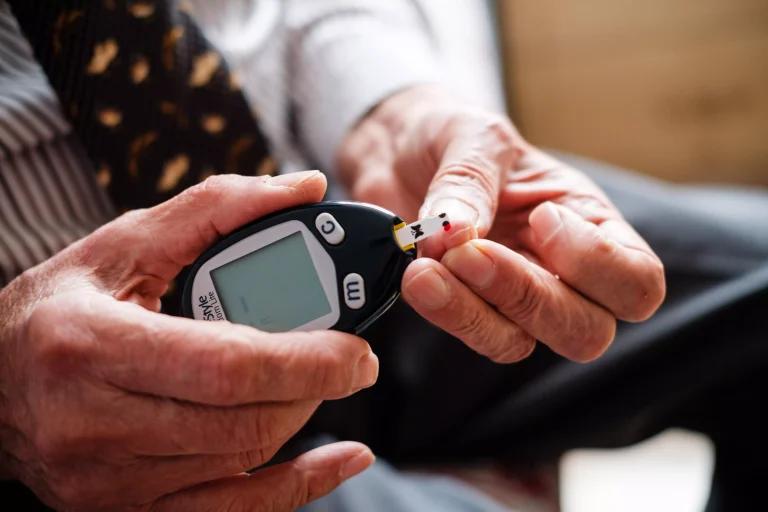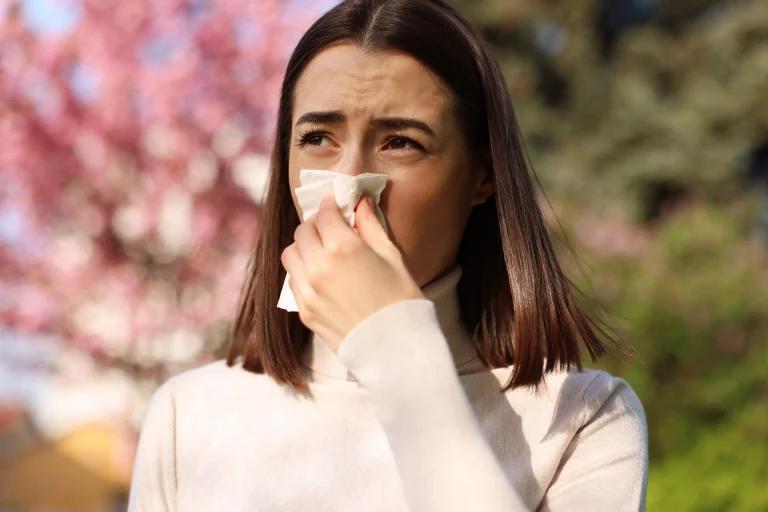Allergic rhinitis is the most frequently recognised form of rhinitis. However, nonallergic rhinitis (NAR) also known as vasomotor rhinitis is also prevalent, affecting millions of people’s quality of life. The exact cause of nonallergic rhinitis is unknown. Experts however believe it occurs when blood vessels in the nose expand. These blood vessels fill the tissue that lines the inside of the nose triggering nasal symptoms. Many things could cause this depending on the type of non-allergic rhinitis you have. For instance, the nerve endings in the nose might react to triggers too easily. These triggers cause nasal symptoms, but without the immune system response of immunoglobulin E (IgE) antibody production.
Let’s take a look at the various causes of non-allergic rhinitis including if autoimmune diseases can be an underlying cause.
How is non-allergic rhinitis different from allergic rhinitis?
Allergic rhinitis can be described as an allergic reaction to airborne substances such as pollen, dust mites, and animal dander. During an allergic response, the immune response releases histamine in susceptible people. This causes the mucous membranes of the nose, eyes and throat to become inflamed, causing allergy symptoms. The symptoms are similar to a common cold but are triggered by allergens, not a virus. Those with asthma or eczema are more likely to develop hay fever.
Non-allergic rhinitis does not involve an allergic reaction, unlike seasonal allergies. There are many causes including smoke, irritants, pollution, changes in weather, or hormonal changes. Non-allergic rhinitis does not involve the immune system, therefore suggesting it is not an autoimmune disease, unlike allergic rhinitis.
Causes and risk factors
Irritant rhinitis
Symptoms typically follow physical exposure, an environmental change or chemical irritant exposure, sometimes without you barely noticing. These triggers cause inflammation and irritation in the nasal airway. Irritants include:
- Changes in temperature or humidity
- Exercise
- Perfumes
- Tobacco smoke
- Odours
- Viruses
Medication
Several drugs cause or aggravate rhinitis symptoms:
- Alpha-blockers
- Blood pressure medications such as angiotensin-converting enzyme (ACE) inhibitors and beta-blockers
- Chlorpromazine
- Aspirin
- Non-steroidal anti-inflammatory drugs (NSAIDs)
- Phosphodiesterase inhibitors
- Cocaine
Prolonged use of decongestant nasal sprays like oxymetazoline can cause rebound congestion (rhinitis medicamentosa).
Hormonal
The body’s response to changes in hormone levels can cause hormonal rhinitis. Nasal passages can swell due to the changes and symptoms can appear. This can occur during events such as:
- Pregnancy
- Beginning the oral contraceptive pill
- Hormone replacement therapy (HRT)
- Hypothyroidism
- Puberty
- Menopause
Food and drink
Gustatory rhinitis is caused by the foods you eat. Alcohol, sulphites, and spicy foods may cause rhinorrhoea and facial flushing.
Non-allergic rhinitis with eosinophilia syndrome (NARES)
Non-allergic rhinitis with eosinophilia syndrome is a rare condition that is diagnosed by the presence of nasal eosinophils (a type of immune cell) in people with perennial symptoms, and sometimes a reduced sense of smell. NARES is a risk factor for developing or exacerbating obstructive sleep apnoea.
Underlying health conditions
Some health conditions can alter blood flow within the nasal passages and affect the regulation of nasal mucosa, contributing to the condition’s characteristic congestion and discomfort. Some conditions that cause this are:
- Cystic fibrosis
- Primary ciliary dyskinesia (Kartagener syndrome)
- Granulomatosis with polyangiitis (previously known as Wegener’s granulomatosis)
Structural
Structural irregularities, like nasal polyps or turbinate tissues, become thin and hard causing symptoms. Ageing may cause changes in the nose, which may cause symptoms of rhinitis in older people.
How is nonallergic rhinitis diagnosed?
Diagnosing allergies involves a combination of medical history evaluation, physical examination, and allergy testing. Here are the common methods used in diagnosis:
Medical history
The healthcare provider or immunology specialist will conduct a detailed medical history interview to understand the patient’s symptoms, their frequency, duration, and potential triggers. They will also inquire about any family history of allergies.
Physical examination
A physical examination helps identify physical signs associated with allergies, such as skin reactions, nasal congestion, or wheezing.
Allergy testing
Allergy testing helps determine the specific allergens triggering an individual’s allergic reactions. Common allergy testing methods include:
- Skin Prick Tests
In these skin tests, small amounts of suspected allergens are pricked into the skin using a tiny needle. If a person is allergic, they will develop a small raised bump at the test site.
Specific IgE (immunoglobulin E) blood tests measure the levels of allergen-specific antibodies (IgE antibodies) in the blood. This helps identify sensitisation to specific allergens.
By confirming the absence of an allergic reaction, your healthcare provider can narrow the focus to non-allergic triggers and tailor a treatment strategy targeting your condition’s specific features.
Elimination diets
For suspected food allergies, an elimination diet may be prescribed, where potential allergenic foods are eliminated from the diet, followed by reintroduction to identify specific trigger foods.
Symptom diary
Keeping a detailed record of symptoms, triggers, and their timing can help identify patterns and aid in diagnosis.
It’s important to consult with a healthcare professional or an allergist/immunologist for an accurate diagnosis. They will assess the individual’s symptoms, perform the necessary tests, and interpret the results for a precise diagnosis.
Nonallergic rhinitis symptoms
Nonallergic rhinitis causes symptoms that are much the same as the ones you get with allergies:
- Postnasal drip
- Runny nose (rhinorrhea)
- Stuffy nose
- Sneezing
A crust inside the nose can also appear in some individuals when the mucus glands in the nose aren’t working well and nasal secretions are low, causing dryness in nasal passages.
How to mange non-allergic rhinitis symptoms
Treatments aim to restore nasal function and improve overall comfort.
Steroid nasal sprays
First-line treatment by healthcare professionals will be corticosteroid nasal sprays such as fluticasone, which are effective in reducing nasal inflammation and congestion. These steroids are available both over the counter and on prescription.
Anticholinergic nasal spray
Intranasal ipratropium bromide is licensed for the management of rhinorrhoea associated with allergic rhinitis. Side effects of nasal dryness and irritation, headache, and throat irritation can occur with this medication.
Antihistamine nasal sprays
Sometimes OTC and prescription antihistamine nasal sprays can be used to treat nonallergic rhinitis, although allergens do not trigger this condition. Oral antihistamines do not have the same therapeutic effect as these nasal sprays.
Decongestants
Decongestant nasal sprays target the inflammation and swelling of the nasal passages, but are a short-term treatment option of 7 days. Prolonged use can cause irritation and rebound congestion.
Lifestyle changes
Also, changes in daily habits often play understated yet important roles in the long-term relief of symptoms, as avoiding triggers known to irritate, such as smoke and strong odours, are proactive steps in managing symptom flare-ups.
Conclusion
A difficult aspect of non-allergic rhinitis is the lack of seasonal patterns commonly seen with allergic rhinitis. The symptoms of non-allergic rhinitis occur all year round making it difficult to pinpoint the triggers. There are ways to reduce the severity and frequency of symptoms by making lifestyle changes and taking medication. The underlying cause of this condition is often unknown, making it difficult to find a permanent solution. This type of rhinitis is not directly linked to immune system activity, making it unlikely to be an auto-immune disease. This form of rhinitis is instead triggered by a variety of non-allergic factors.
Sources
- Nonallergic rhinitis – Symptoms & causes – Mayo Clinic
- Non-allergic rhinitis – NHS
- Nonallergic rhinopathy: MedlinePlus Medical Encyclopedia
- Non‐allergic rhinitis: Position paper of the European Academy of Allergy and Clinical Immunology – Hellings – 2017 – Allergy – Wiley Online Library
- Nasal Allergy, Rhinitis and Allergic Rhinitis – Allergy Asthma Network
Medical Disclaimer
NowPatient has taken all reasonable steps to ensure that all material is factually accurate, complete, and current. However, the knowledge and experience of a qualified healthcare professional should always be sought after instead of using the information on this page. Before taking any drug, you should always speak to your doctor or another qualified healthcare provider.
The information provided here about medications is subject to change and is not meant to include all uses, precautions, warnings, directions, drug interactions, allergic reactions, or negative effects. The absence of warnings or other information for a particular medication does not imply that the medication or medication combination is appropriate for all patients or for all possible purposes.









